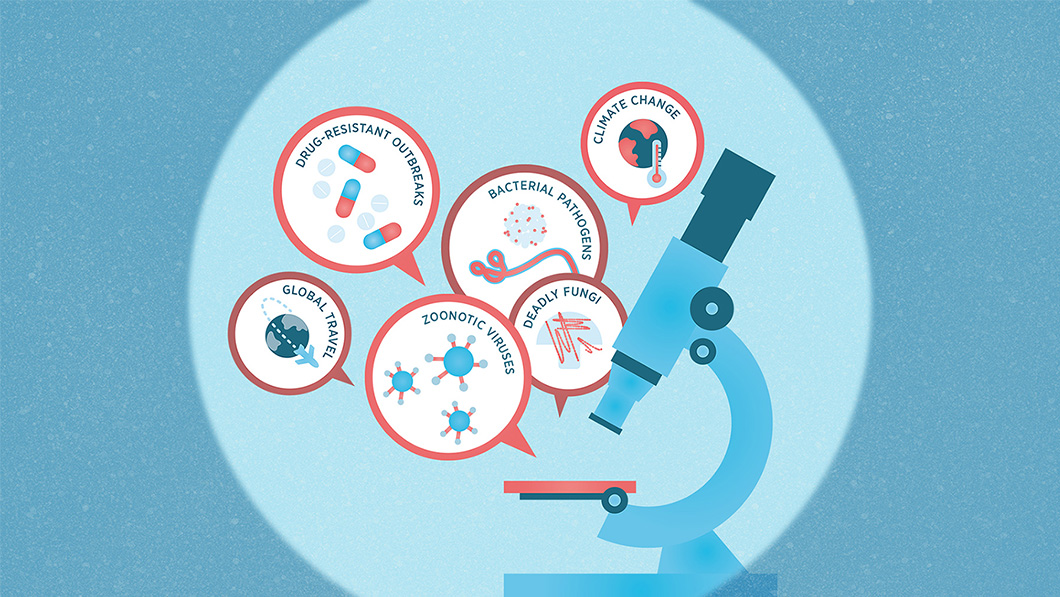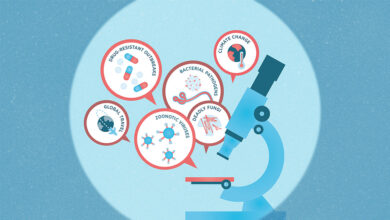
The U.S. has a new plan and Canada falls behind
Sponsored by:

PPF: Health Security
PPF’s report The Next One: Preparing Canada for another health emergency outlines the lessons learned from the pandemic and how Canada can safeguard against future health emergencies. To keep the discussion going — and to keep Canadians informed — this newsletter looks at what’s happening in the world of health security each week. Here’s what we’re following:
U.S. global health security plan
The U.S. government has released its global health security strategy (GHSS) for 2024. The strategy outlines how the government plans to deliver on goals outlined in the 2022 National Biodefence Strategy and Implementation Plan and the Global Health Security and International Pandemic, Preparedness and Response Act.
The new GHSS sets out to achieve three key objectives. For one, it will strengthen global health security capacities through bilateral partnerships — the U.S. says it will work with other countries to try to detect, prevent and respond to global health security threats, including by expanding its formal global health security partnerships from 19 to 50 countries. The U.S. also says it will “catalyze political commitment, financing, and leadership to achieve health security” through international accords and regulations, supporting institutions that provide public health guidance, innovation, and rapid response to global health emergencies, and by expanding equitable access to medical countermeasures.
(Notably, the U.S., along with other developed nations, is facing scrutiny for its stance on the WHO’s Pandemic Agreement — specifically regarding the proposal to temporarily waive intellectual property rights on drugs during a pandemic, which other nations have argued would improve access.)
Finally, the U.S. says it’s committed to “maximizing linkages” between global health security programs and other health, development and security programs to create more sustainability, drive better outcomes and make better use of resources.
“We stand at an inflection point in history, where the decisions we make now will determine the course of our future for decades to come,” President Joe Biden wrote in his introduction to the report, adding that it will “ensure we remain vigilant to possible threats at this critical moment and help set a more secure, sustainable, and healthy course for our people and for people around the world.”
Budget letdown
Canada, meanwhile, appears to be out of step with the U.S. in the race to prepare for the next health emergency. Last week’s federal budget did not include funding to create an agency that could dramatically improve Canada’s overall health security, elevate its standing in the global life sciences market and provide emergency response to Canadians, writes Steven Hogberg, PPF Health and Life Sciences Policy Lead. Health security experts have been advocating for a Canadian version of America’s BARDA (the Biomedical Advanced Research and Development Authority) or the EU’s HERA (the Health Emergency Preparedness and Response Authority). “When it comes to the next health emergency — whether viral, bacterial, radiological or environmental — citizens in those countries can rest assured that a plan, network and resources are in place to pivot and rapidly respond,” writes Hogberg in a recent op-ed. “So where does that leave Canada? Quickly falling behind.”
This week on WONK, Mark Podlasly on the really big news hidden in Budget 2024
Vaccine ROI
A new study from the independent research organization, the Office of Health Economics (OHE) — timed to coincide with the WHO’s World Immunisation Week — says that adult immunization programs can return “up to 19 times” their initial investment, through benefits to individuals, the health-care system and wider society (or a return of $4,637 per individual full vaccination course).
The study, which was commissioned by the International Federation of Pharmaceutical Manufacturers and Associations (IFPMA), focused on how vaccines for flu, RSV, pneumococcal disease and herpes zoster (shingles) were delivered across 10 countries. It concluded that all the vaccine programs delivered “substantial returns on government investment,” and that socio-economic returns for adult immunization programs are proportional to those for childhood programs.
But the report also notes that despite this apparently high return on investment, “access to adult vaccination is inconsistent across the world.” Adult immunization programs are already recognized as vital in countries where populations are aging (like in the 10 countries the OHE study examined). Indeed, this was the argument put forward in a 2021 “manifesto” from a group of Italian researchers, prompted by the impacts of the pandemic, for example. “The benefits of vaccination should become a major and ongoing topic of conversation beyond the current pandemic context,” they wrote.
NK Bioweapons
A new report from the U.S. State Department on global arms control speculates that North Korea continues to operate a “dedicated, national-level offensive” bioweapons program, and speculates that North Korea may also be capable of using CRISPR systems (used for gene modification in living cells and organisms) to “genetically engineer biological products” to use in bioweaponry.
The report says that North Korea “probably is capable of weaponizing [bioweapon] agents with unconventional systems such as sprayers and poison pen injection devices.”
As one military analyst told NK News, the prospect of genetically modified bioweapons raises concerns about effective defence and treatment.
Meanwhile, the head of the FBI flagged Chinese government-linked hackers as a looming threat to U.S. critical infrastructure. Christopher Wray said that hackers are waiting “for just the right moment to deal a devastating blow” and that China is developing the “ability to physically wreak havoc on our critical infrastructure at a time of its choosing.”
‘Enormous’ avian flu concern
The threat of the ongoing spread of avian flu infections around the world, including in a small number of humans, is a “huge concern,” said the WHO’s chief scientist in a recent release. Dr. Jeremy Farrar said that “we have to… make sure that if H5N1 did come across to humans with human-to-human transmission, that we were in a position to immediately respond with access equitably to vaccines, therapeutics and diagnostics.” But, he pointed out, vaccine development is not “where we need to be.”
Farrar’s comments came the same day that the ranking member of the U.S. Senate committee on Health, Education, Labor, and Pensions asked for continued briefings from the Biden administration on the ongoing H5N1 outbreak. Farrar’s concerns also precede the next round of talks by WHO member states over a pandemic accord, set to resume April 29. Discussions to this point have been fractious, as countries attempt to settle disputes around intellectual property for vaccines during emergencies.
Meanwhile, U.S. officials are being criticized for not disclosing key information about the outbreak of H5N1 in some dairy cattle herds (now 29 across eight states). U.S. officials have not said whether pasteurization of milk kills the H5N1 virus that was discovered in dairy cattle, or whether the affected herds are all part of a single outbreak. As one expert told STAT News, the U.S. Department of Agriculture’s silence is “creating the perception that something is happening or not happening that would not meet with the public’s approval… There’s no evidence here that there’s some kind of a smoking gun, that somebody did something wrong. Just tell us what you’re doing.”
Events
April
- April 23-24: Public Health 2024. Halifax, NS.
- April 23-29: Intergovernmental Negotiating Committee(4th session). Ottawa, ON.
- April 29: Stat in DC: Policy in Health Care. Washington, DC.
May
- May 6-7: International Conference on Vector-Borne Diseases, Public Health Resilience and Individual. Ottawa, ON.
- May 6-9: The Global Synthetic Biology Conference. San Jose, CA.
- May 12-14: Bio€quity Europe. San Sebastián, Spain.
- May 13-16: AAPS 2024 National Biotechnology Conference. San Francisco, CA.
- May 13-17: PEGS Boston. Boston, MA
- May 16: US Pharma and Biotech Summit. NYC, NY
- May 16: STAT Breakthrough Summit West. San Francisco, CA.
Did someone forward you this newsletter? Subscribe to PPF: Health Security newsletter
This newsletter is produced by journalists at PPF Media. It maintains complete editorial independence.



